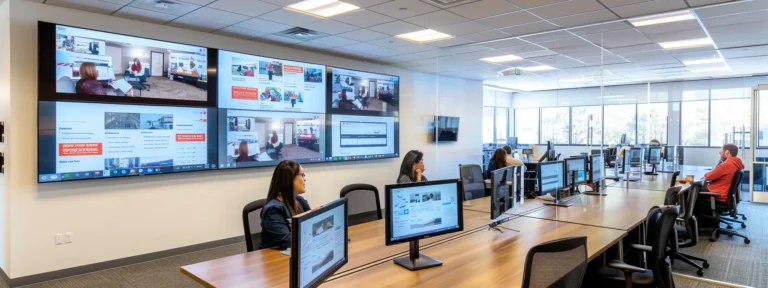Heads Up: When you purchase through links on our site, we may earn an affiliate commission at no cost to you.
Expanding your business across different regions requires a well-thought-out SEO strategy. One critical aspect is mastering keyword research for multiple locations. Whether targeting nearby cities for your plumbing business or optimizing a Google Business Profile for multiple franchises, understanding location-specific keywords is essential for reaching your target audience and improving your visibility on search engine results pages (SERPs).
This comprehensive guide will teach you how to conduct effective keyword research for multiple locations. It will ensure your content aligns with user intent and maximizes local SEO efforts.
Key Takeaways
- Localized Keyword Strategy: Conducting keyword research for multiple locations helps target specific zip codes, cities, and regions, improving visibility in local search results.
- Tools for Optimization: Tools like SEMrush, Google Ads Keyword Planner, and Google Search Console simplify keyword discovery and performance tracking across locations.
- Long-Tail Keywords Matter: To capture niche audiences and increase conversion rates, focus on specific, location-based long-tail keywords, such as “affordable plumbing repair in Brooklyn.”
- Create Location Pages: Dedicated location pages with unique content, schema markup, and customer testimonials boost relevance and search engine rankings.
- Google Business Profile: Optimize your Google Business Profile with accurate NAP details, keywords, and location-specific images to enhance local SEO.
- Avoid Keyword Cannibalization: Assign unique keywords to each page to avoid internal competition that dilutes rankings.
- Leverage Backlinks and Citations: Build backlinks from local sites and maintain consistent NAP data in local directories for improved authority and rankings.
- Monitor Performance: Use tools like Google Analytics and Looker Studio to track traffic, engagement, and conversion rates for each location.
- Mobile Optimization: Ensure your site is mobile-friendly to accommodate the majority of local searches made via mobile devices.
- Focus on User Intent: Align keywords with user intent to create content that resonates with the target audience and drives engagement.
Why Keyword Research for Multiple Locations Matters

1. Increased Visibility in Local Search
Targeting location-specific keywords ensures your business appears in local search results, helping customers in specific regions find you easily. For example, someone searching for “plumbing services in Chicago” is more likely to find your business if your content includes such targeted phrases.
2. Boosts Organic Traffic
By optimizing for multiple locations, you can capture more organic search results, drive traffic to your landing pages, and improve your overall web presence.
3. Enhances Customer Experience
Localized keywords make your content more relevant to your audience, improving user experience and engagement. Personalized and locally targeted content resonates better with potential customers.
4. Supports Advertising Campaigns
Keyword research lays the foundation for creating effective Google Ads campaigns. It helps you allocate your budget wisely and maximize ROI. Localized keywords can also enhance the relevance of your advertising campaigns.
- Instant feedback
- Valuable insights
- Actionable tips
Step-by-Step Guide to Keyword Research for Multiple Locations

Step 1: Define Your Target Locations
Start by identifying the cities, regions, or zip codes you want to target. For example, if you run a brick-and-mortar store, you might focus on areas where your customers are concentrated.
Action Points:
- Use demographic data to identify high-potential locations.
- Create a list of locations using tools like Google Analytics or customer data.
- Consider areas where your competitors are active to find untapped opportunities.
Step 2: Brainstorm Local Keywords
Generate a list of local keywords that include city names, neighborhoods, or region-specific terms. For instance, “plumbing services in Austin” or “best insurance agency in Chicago.”
Tools to Use:
- Google Trends: Identify trending keywords in specific areas.
- Google Search Console: Analyze existing keywords that drive traffic to your site.
- Autocomplete Suggestions: Use Google Search‘s autocomplete feature to discover local queries.
- SEMrush: Generate keyword ideas tailored to specific locations.
- Keyword Planner: Use Google Ads Keyword Planner for volume and competition insights.
Step 3: Research Long-Tail Keywords
Long-tail keywords are more specific and often less competitive, making them ideal for targeting multiple locations. For instance, you could use “affordable plumbing repair in Brooklyn” instead of “plumbing repair.”
Benefits:
- Higher relevance to local intent.
- Better chances of ranking on SERPs.
- Improved conversion rates.
Step 4: Use Keyword Tools for Multiple Locations
Several tools can simplify keyword research for multiple locations:
- Google Ads Keyword Planner: Identify high-performing keywords and their search volumes for specific locations.
- SEMrush: Analyze keyword trends across different regions.
- Google Business Profile Insights: Discover how users find your business.
- Spreadsheet Management: Organize your keywords by location in a structured spreadsheet for better planning.
- Google Trends: Pinpoint seasonal variations and compare keyword popularity across regions.
Step 5: Create Location Pages
Develop dedicated location pages for each region you want to target. These pages should include:
- Local keywords in titles, headings, and metadata.
- A clear description of services specific to that area.
- Schema markup to improve search visibility.
- Customer testimonials or reviews relevant to the location.
- Specific images and visual content to resonate with the local audience.
Step 6: Optimize Your Google Business Profile
Ensure your Google Business Profile is updated for all your locations. Add keywords to your business description and upload location-specific images.
Key Details to Include:
- Accurate business name, address, and telephone number (NAP consistency).
- Local keywords in service descriptions.
- Categories and attributes that match your offerings.
- Use location-specific posts to engage customers actively.
Step 7: Avoid Keyword Cannibalization
Targeting the same keyword across multiple pages can lead to keyword cannibalization, which dilutes your rankings.
Solution:
- Assign unique keywords to each location page.
- Tools like SEMrush or Google Search Console can be used to track keyword performance.
- Ensure each page addresses distinct customer needs and queries.
- Valuable Keywords Insight
- Actionable Data
- Save Hours of Research
Leveraging Local SEO Techniques

Add Citations
Citations are mentions of your business on local directories and websites. They play a crucial role in improving your local search rankings.
Tips:
- Use platforms like Yelp, Bing Places, and local business directories.
- Ensure NAP consistency across all citations.
- Encourage reviews on these platforms to boost credibility.
Build Backlinks
Backlinks from local websites increase your authority and relevance for specific regions.
Strategies:
- Collaborate with local blogs or news outlets.
- Sponsor local events to gain mentions.
- Partner with complementary businesses in the area.
Monitor Performance
Use analytics tools to track the effectiveness of your keyword strategy. Monitor traffic, conversion rates, and customer behavior to refine your approach.
Recommended Tools:
- Google Analytics: Measure traffic and engagement.
- SEMrush: Track keyword rankings and backlinks.
- Google Search Console: Identify technical issues and performance trends.
- Looker Studio: Visualize performance data for better insights.
Avoiding Common Mistakes

Keyword Stuffing
Overloading your content with keywords can harm your rankings. Instead, focus on creating high-quality content that naturally incorporates keywords.
Ignoring User Intent
Ensure your keywords match the needs and expectations of your target audience. For example, someone searching for “emergency plumbing in Dallas” will likely seek immediate help.
Neglecting Mobile Optimization
Many local searches occur on mobile devices. Ensure your site is mobile-friendly to enhance customer experience.
Forgetting About Conversion Rate Optimization
Driving traffic is only half the battle. Optimize your landing pages with clear CTAs, contact forms, and fast load times to increase conversions.
Practical Example: Keyword Research for a Multi-Location Real Estate Sites

Imagine you own a plumbing business with locations in Chicago, New York, and Los Angeles. Here’s how you’d approach keyword research:
- Identify Local Keywords:
- “sell my house in foreclosure Chicago”
- “sell my house New York”
- “Home Buyers Los Angeles”
- Develop Location Pages:
- Include unique content for each city.
- Add reviews and photos from that location.
- Incorporate specific CTAs like “Request a Demo” or “Call Us Today.”
- Monitor Performance:
- Use Google Analytics to track traffic and conversions.
- Adjust your strategy based on user behavior data.
- Leverage Google Search Console to monitor keyword performance.
- “sell my house in foreclosure Chicago”
- “sell my house New York”
- “Home Buyers Los Angeles”
- Include unique content for each city.
- Add reviews and photos from that location.
- Incorporate specific CTAs like “Request a Demo” or “Call Us Today.”
- Use Google Analytics to track traffic and conversions.
- Adjust your strategy based on user behavior data.
- Leverage Google Search Console to monitor keyword performance.
Frequently Asked Questions
What is keyword research for multiple locations?
Keyword research for multiple locations involves identifying and optimizing keywords specific to different cities, regions, or zip codes to improve local search visibility.
Why is local keyword research important?
Targeting location-based keywords helps businesses appear in local search results, increasing traffic, enhancing relevance, and attracting more customers.
How do I find local keywords?
Use tools like SEMrush, Google Trends, and Google Ads Keyword Planner to identify high-performing keywords specific to your target locations.
What are long-tail keywords, and why are they important?
Long-tail keywords are specific phrases, such as “24-hour plumbing services in Austin.” They are less competitive and highly targeted, improving your chances of ranking and converting leads.
How do I avoid keyword cannibalization?
To ensure that pages don’t compete for the same terms, assign unique keywords to each location page and monitor performance using tools like Google Search Console.
What should I include in a location page?
Location pages should feature localized keywords, unique content, customer reviews, schema markup, and contact details specific to the region.
How does Google Business Profile impact local SEO?
An optimized Google Business Profile enhances local visibility, helps customers find your business easily, and improves your rankings in Google Search and Maps.
What tools are best for multi-location keyword research?
SEMrush, Google Search Console, Google Trends, and Keyword Planner are top tools for discovering and analyzing location-specific keywords.
How do I monitor the performance of location-based keywords?
Track traffic, rankings, and engagement for each location page using Google Analytics, SEMrush, and Looker Studio.
What are citations, and why are they important?
Citations are mentions of your business on local directories. They improve local SEO by enhancing authority and providing consistent business information across platforms.
Conclusion
Mastering keyword research for multiple locations is essential for businesses aiming to grow their local presence. You can enhance visibility, attract the right audience, and drive conversions by leveraging tools, creating tailored content, and optimizing your Google Business Profile. Follow the steps outlined in this guide to streamline your efforts and achieve success in local SEO.
Ready to enhance your multi-location keyword strategy? Start researching today, upload your optimized content, and watch your business thrive across regions!














